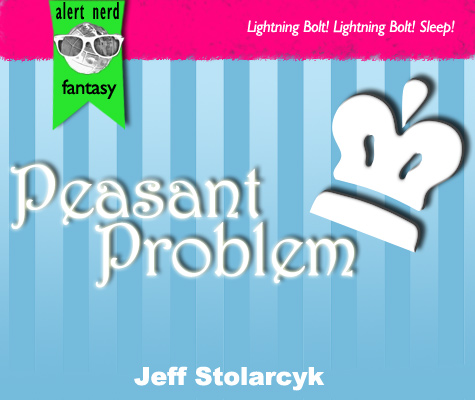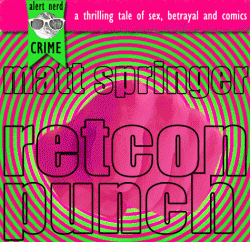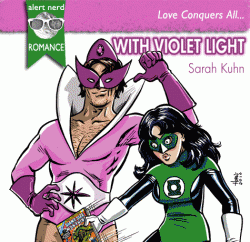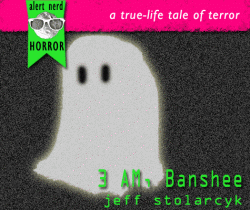Alert Nerd Press Spotlight: Ken Simon
Alert Nerd Press Spotlight: Ken Simon
Apr 20Ken Simon’s “The Tygress Theory” was the very first submission we received for our very first issue of Grok back in 2008. The piece, inspired by our “Pon Farr” theme, charted Ken’s adventures in online dating (back before online dating was, like, A Thing), and his earnest attempts to forge connections that weren’t always meant to be. It was funny and thoughtful and self-deprecating without being self-flagellating — and it really set the tone for what Grok would become.
In Grok #2, Ken wrote about his longtime fascination with connectivity, from rotary phones to “party lines” (remember those, fellow old people?) to screechy modems dialing faceless strangers. I loved his willingness to reveal the depth of his obsession when it comes to this stuff, and the ways in which it connects back to the person he is today.
We’re hoping we can convince Ken — who maintains a mild-mannered librarian/superhero identity during the daylight hours — to contribute to future issues of Grok. In the meantime, we’ve conducted a little interview with him. Read on, then check out his excellent words in “The Tygress Theory” (page 20) and “Connected: The Secret Origins of Ordinary” (page 10).
Sarah: Ken, please tell these nice people about your writing background.
Ken: In the first grade, I received accolades for my from-memory novelization of Three Billy Goats Gruff. A scant five years later, I entered a poetry contest for the low, low price of $4.99, and — lo and behold — I won, which meant that my poem was to be published in The World’s Greatest Poetry. Said collection could be mine for the discounted “winners only” price of $19.99. Weeks later, opening the huge tome and realizing that its poorly laid out innards were crammed full of every paid entry in the contest was a splash of icy water on my fresh little face. I’m pleased to say that since that time, it’s all gone further downhill. My short stories and poetry increased in frequency and angst, and in 1991, I received a notice of admission from San Francisco State University’s M.F.A. program in Creative Writing. I traveled to SF, toured the campus, applied for student housing, and a few weeks later was informed that, oops, sorry, they hadn’t meant to admit me. Despite this soon-to-be-a-major-motion-picture turn of events, I have continued to write. My attention span hasn’t allowed me to get past the short story and occasional unfinished novel. I seem to have writer’s block more often than not, which explains both why I haven’t submitted material for every issue of Grok, and also why I haven’t won a Nobel Prize for Literature. (Well, it’s not the only explanation for the latter, but it’s the one upon which I prefer to dwell.)
Sarah: When you first submitted “The Tygress Theory,” you claimed to be “nervous” and noted that you were thinking about not even sending it. WTF? We’re not that scary!
Ken: I’m not the most self-confident person in the world. This is a big part of why I didn’t end up pursuing acting as a career. (No, really, I’m serious this time.) When I produce something creative, in writing or on stage, I expect an inverse correlation between how much I believe in it and how well others receive it. If it weren’t for spousal encouragement, I probably would never have submitted to Grok. Thank you, Kelly.
Sarah: Both of your pieces deal with communication of the internet-y kind. What is it about that topic that fascinates you?
Ken: I’ve always been fascinated by the subtleties underlying human communication but it’s very hard to get to the root of it. It feels instinctual and it manifests in various ways. In college, years after my childhood phone antics, I studied Conversation Analysis, in which talk is recorded and broken down into minute detail. Pauses are timed down to the tenth of a second. The data is mined for revelations about how we communicate, and how we negotiate and reinforce personal and professional relationships. Beyond conversation itself, I’m drawn to the effect of technology as an intermediary between humans. In fact, my undergraduate thesis in 1991 was an analysis of internet chat room interaction. When I wrote my library school master’s thesis, it was a study of the effect of the computer as intermediary between librarian and patron. I’m still not answering your question, am I? Well, OK. My second Grok piece, in Summer 2008, gets closest to the heart of it. I see communications technology not as a collection of programmed gadgets made up of components, but as a living gateway to a 3-dimensional world that carries human perception around inside of it and filters it in various ways. A dimension not only of sight and sound, but of…never mind. I hope this makes some sense; it’s not something that I am used to articulating.
Sarah: In “Connected,” you also discuss your younger self’s complete fascination with the phone. Do you have a favorite phone prank or incident from your checkered past?
Ken: When three-way calling was first available, a whole new world of opportunity opened up. I called Kentucky Fried Chicken, then called the Pioneer Chicken around the corner from it, and connected them together. I stayed mum as the chickenistas debated about who had called whom, and why.
Sarah: Both pieces feature key moments at badly-lit chain restaurants: Denny’s and Straw Hat Pizza. If you had to eat at one of them now, which one would it be? (Death is not an option.)
Ken: While I wouldn’t mind attacking my arteries with a Denny’s grilled cheese sandwich and mozzarella sticks, I’m going to have to go with Straw Hat Pizza on this one. Pizza always wins. This may explain why every Sunday, I attend the kind of meeting that begins with a weigh-in.
Sarah: Are you still involved in any online communities?
Ken: Not deeply involved, no. At least not in the way I used to be. Probably my last deep involvement was in an e-mail list for fans of Ani DiFranco. We all just clicked, and for a few months, we got to know each other and talked about all sorts of things. Then an influx of new people came into the mix, the cohesion was lost, and the community was gone. That was in the mid-90s. Since then, I’ve logged into the occasional olde tyme chat room to see who still uses it, and I’ve blogged a little and joined the horde on Friendster, then MySpace, then Facebook and Twitter. Are these really online communities, though? No. I use them mostly to connect and reconnect with people I already know. The small, closely-knit groups I once knew are long gone, and I don’t have the time or motivation to seek them out again.
Sarah: Finally, please explain your geek cred (stuff you’re geeky about and why).
Ken: Um, uh, well. You see, this is the other reason I was nervous about submitting to Grok. My definition of geekiness had me believing that I didn’t possess any cred. Comics? Yeah, sure. I read one issue of Richie Rich, one Adam-12, and the free comic book they gave out at Bob’s Big Boy. Trek? I read lots of Trek novels, and watched ST:TNG with devotion, but that’s hardly noteworthy, and I was outgeeked by millions of other ST fans. I played D&D but stopped when I was 13 years old. It took a while (and two issues of Grok) for me to understand that I had the concept of “geek” all wrong. You don’t become a geek just by fitting into some stereotypical set of obsessions. You have to be a geek about something that MEANS something to you. For a lot of people, it’s comics, or Trek, or that one episode of The Greatest American Hero where a post-hypnosis Robert Culp repeatedly puts himself under by saying the word “scenario.” For me, though, it is the communication, the technology, the net-ness of all our minds communicating with each other.
Oh, and I own a librarian action figure, with “amazing push-button shushing action.”
Maybe that’s all I had to say in the first place.











You’re welcome! =)